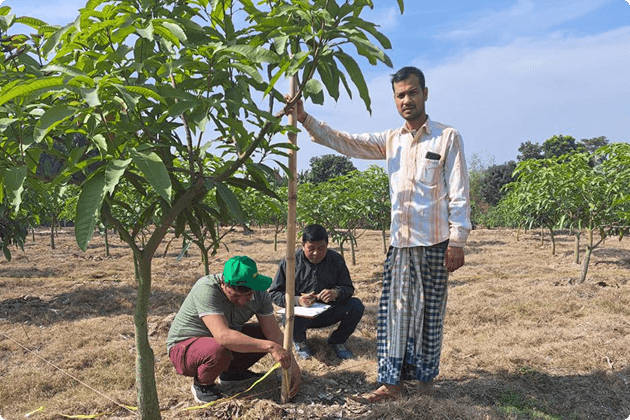Green Trajectory: Transforming Emissions into Solutions

SFSA Bangladesh has launched a pioneering initiative that utilizes carbon credits to support smallholder farmers through the implementation of horticultural agroforestry systems. Carbon credits are a market-based system that incentivizes the reduction, removal, or avoidance of greenhouse gas (GHG) emissions, measured in terms of carbon dioxide equivalent (CO2-eq). This initiative holds particular significance for Bangladesh, a country highly vulnerable to climate change and committed to sustainable development.
Despite being among the lowest emitters of GHG globally, Bangladesh has pledged to reduce carbon emissions by 22% (89.47 million tonnes), by the year 2030. In line with this commitment, SFSA Bangladesh has entered the carbon market to support farmers in the Barind Tract of the Rajshahi division. This region faces challenges such as soil erosion, limited nutrient retention capacity, and water shortages, making traditional crop cultivation difficult. However, these conditions also present opportunities for sustainable land use by cultivating tree fruit crops like mango, guava, and jujube, offering improved soil fertility and diversified income sources.
To realize this potential, SFSA Bangladesh initiated the ‘Carbon Credit Income for Climate Smart Technology Adaptation (CCICTA)’ project in 2023. This project aims to enable farmers to generate carbon credits while incentivizing the adoption of climate-smart farming methods, such as drip irrigation and fruit tree planting, to reduce GHG emissions and increase farmer income. Over 20 years, an estimated 1.3 million tCO2eq of GHG emissions will be reduced (equivalent to the annual GHG emissions from about 280,000 passenger vehicles), generating approximately USD 14.5 million in carbon credits, with the majority of the benefits directed to farmers. This new project is constructed upon a solid foundation of experience gained from two preceding initiatives, sponsored by The Coca-Cola Foundation and HSBC Bangladesh and supported by 2030 Water Resource Group.
The project’s ambitious goal is to register 10,000 hectares of land in the carbon market, with 5,000 hectares and 3,000 farmers already participating in afforestation, reforestation, and revegetation (ARR) activities. This endeavor is supported by Varaha Climate AG Private Limited, which specializes in nature-based climatic innovations aimed at steering emissions towards net zero and beyond. The DASCOH Foundation, as a project partner, is instrumental in reaching out to farmers and influencing their revenue and the environment positively.
SFSA is committed to engaging various market players and stakeholders to contribute to carbon reduction, climate resilience, and sustainable agriculture, all of which align with the Sustainable Development Goals. Utilizing our expertise, knowledge, and networks, we aim to share evidence-based results on this initiative with relevant ministries so that we may collectively create a sustainable impact on the carbon credit market.
Disclaimer: This write-up was created by the Syngenta Foundation for Sustainable Agriculture (SFSA), now rebranded as the Sustainable Agriculture Foundation (SAF).
Share










